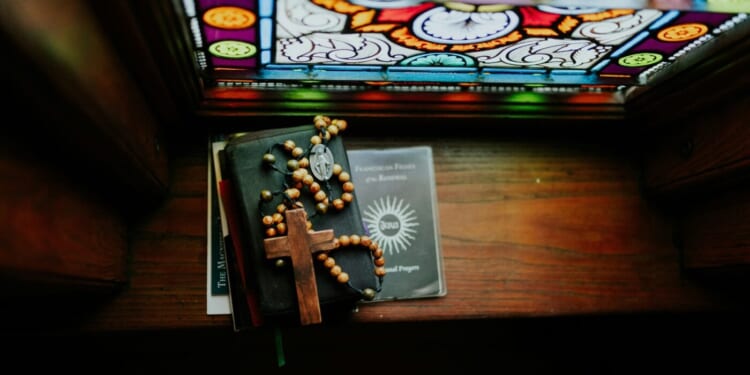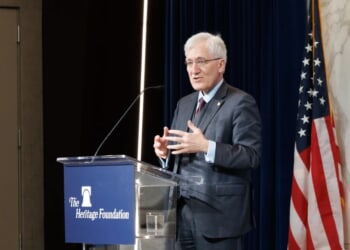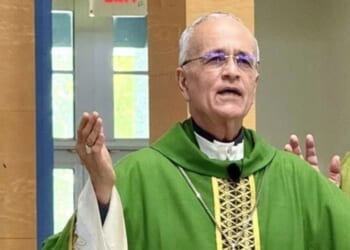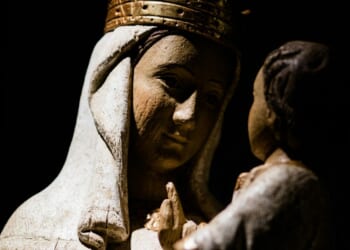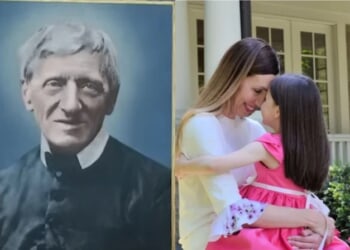I’m reading the biography of St. Martin de Porres—again.
And I’m feeling spiritually inferior—again.
I mean, the guy could teleport. TELEPORT!
Divine superpowers aside, the life of my Dominican big brother is remarkable, but it’s remarkable in its extreme simplicity. Yes, he performed healing miracles. Yes, he saved sinners from hell. Yes, he continues to intercede for millions as his works of mercy on earth echo into eternity.
And grace continues to inundate his holy essence.
“How do I get that?” I ask myself (which is why I’m reading the book again—to figure out how). How does a regular Joe Catholic layman achieve holiness like a religious?
Is the lay spirituality definable?
Is holiness as a non-consecrated even possible?
Famed newspaper columnist Amy Dickinson once wrote, “We are not our best intentions. We are what we do.”
Let’s figure out what St. Martin did to become holy and see if his actions can be copied in today’s world for a layperson.
He Never Slept at Night
Instead, he would stay awake by scourging himself in three separate (and very bloody) moments. The first bludgeoning was for his own sins. A few hours later, after mending his wounds, he’d replace his iron-tipped chords with hard-knotted ropes and flog himself for the souls in purgatory. Later still, he’d whip himself with metal chains for the conversion of sinners. Instead of dreaming peacefully after a full day’s work, he’d torture himself for the forgiveness of his sins, the sins of the poor souls in purgatory, and the sins of the living.
I don’t think my family would approve of a black-and-blue (and sleepless) daddy.
He Fasted Indefinitely
Every day, he would only eat bread and water, unless it was a Eucharistic feast day (like Corpus Christi), when he allowed himself to eat vegetables and sweet potatoes. Curiously enough, he never ate meat. Even more curiously, the indigenous natives of Peru considered sweet potatoes as bread. So, essentially, he always fasted.
I don’t think my family would appreciate me being away from the dinner table.
He Spent His Life at the Service of Others
At the age of 16, he became a barber and surgeon, a joint profession that was common in Peru (and the world) in the 1500s–1600s. He then downgraded his career to become a donado, a lay servant to the Dominican Monastery of the Holy Rosary in downtown Peru. In today’s terms, he basically went from well-respected doctor in the world to a janitor at a church. After years of sweeping the corridors and cleaning the bathrooms, he eventually put his hair cutting and surgical talents to use by helping the Dominican brothers and priests heal from their constant infirmities—on top of his janitorial duties.
Perhaps this might be the closest comparison we can draw between St. Martin’s life and our own: the constant activity of the layman is similar to his constant activity with his community.
Now that we’ve found the thread that binds laity to religious, let’s pull on it a bit, shall we?
The Theology of “Busy-ness”
In today’s world, especially in American society, the mantra is “your worth is in your production.” So, we work more hours than we can handle. We have hobbies that fill our free time. We fill every boring moment with screens. And, if we have any energy left, we spend it (reluctantly, impatiently, exhaustedly, and/or guiltily?) with our loved ones, because there’s always something else we should/could be doing to get ahead in life. There’s always the next promotion, the next side hustle, the next personal record, the next paycheck.
The world preaches survival, comfort, and flourishing.
But what if there was something simpler? Like…peace?
What if our worth wasn’t based on our production but on our existence? This is what St. Martin’s life depicted. He was grateful for his existence and lived a simple life of service. He never pursued worldly honors nor economic stability—on the contrary, he ran from such things. His life as a religious was simple.
St. Martin’s life preached presence, community, and…flourishing.
The Secret Sauce: Obedience
The religious make three vows—poverty, chastity, and obedience. They are able to make these vows to a greater degree than the laity because they are detached from lay matters. Religious matters require an intense focus on this detachment, for it is through it that they are able to, as St. Luke wrote in Acts of the Apostles, “devote [themselves] to prayer and to the ministry of the word” (Acts 6:4).
The lay person can make these vows, too. However, the degree to which a layman or woman is called to practice these virtues varies depending on their state in life and their primary vocation. Are they married? If so, virginity is exchanged for the hope of children. Do they have children? If so, money must be made to support the family.
But obedience…
That’s where the connection between lay people and religious life overlaps in perfect unison. It is also in this virtue (or vow) that both have their spirituality defined.
St. Martin de Porres was dedicated to the Dominican Order. The tasks given to him by his superiors were law, so much so that he was said to never have even slightly encroached beyond the most miniscule of rules. And when the brothers of his monastery waivered, he was there to remind them of St. Paul’s words: “peace and mercy be upon whoever follows this rule” (Gal. 6:16).
For a consecrated religious brother or sister, their superior is clearly defined, as is the Rule by which their religious community abides.
But what about the layman? Who is his superior? And the lay woman? To whom must she obey?
For all, our superior is the pope, by way of our diocesan bishop and parish priest. Thus, we honor the scripture’s guidance in allowing the religious to be devoted to prayer and to the ministry of the word, while we, the laity, look to them to preach to us that which they guard with their vocations—namely the sacraments and traditions of the Church.
It is by this obedience that every spirituality is defined—for obedience is a synonym of love.
This adds to the plates of the married couple, though, for the married man has his wife as his superior, and the married woman has her husband as her superior. The two are one in love and obedience to one another (Eph. 5), while both are obedient to the Church.
St. Martin De Porres, religious though he is, preaches to the laity this simple truth: we cannot love those we do not obey. Nor can we teleport, bilocate, heal, or provide for the needs of the poor. We must obey God, and thus love God, by loving one another.
The religious life is simple and straightforward: follow the clear and written rules of the Order, and you’ll become holy.
The lay person, however, is unbound in their journey toward sanctity, which makes for a myriad of possible spiritualities based on the rules by which each member of the laity places upon themselves. So while the Dominicans take their lead from Holy Father Dominic, and the Franciscans live life by the practices Brother Francis left them, the laity look to models that are living, breathing “rules”…
Like Jesus.
And the really funny thing? All who follow Him, be they laity or religious, become Him.
And as a result? They become love; and graces inundate their lives.
So, is a lay spirituality definable?
Sure. All spiritualities are defined by love and He Who is Love.
But the heights to which we reach spiritually vary depending on how simple our rules are and how heroically we live them.
May St. Martin De Porres, who lived simply, and simply loved, simply listen to our longings for a simpler life.
Photo by Martin Jernberg on Unsplash

